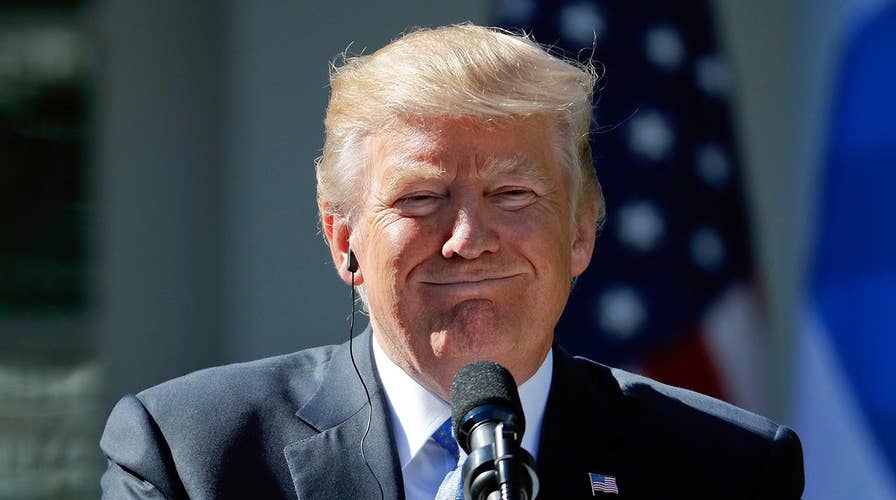President Trump: ObamaCare is virtually dead
The president says insurance companies have made a fortune.
President Trump on Tuesday appeared to back a "short-term" bipartisan deal meant to extend federal payments to health insurers that he sought to block just last week.
“This is a short-term solution,” Trump said from the Rose Garden. “It will get us over this intermediate hump.”
Republican Sen. Lamar Alexander of Tennessee and Democratic Sen. Patty Murray of Washington have been working on a proposal that would continue federal payments to health insurers for two more years.
Republicans, in exchange, want Congress to give states the flexibility they need to avoid coverage requirements under former President Barack Obama’s health care law.
Trump cut off the funding to insurers last week -- leading to fierce objections from Democrats -- but said he wants a bipartisan deal to continue the subsidies temporarily. He said Tuesday the White House has been working with the senators on the stopgap plan.
Despite the apparent compromise, the president did not back down on his own very public disdain for ObamaCare, claiming the landmark law is a "disaster" and "everything but dead." He added that Republicans had enough votes now to repeal the law but did not provide details.
Trump made the comments during a joint presser with Greek Prime Minister Alexis Tsipras. The two leaders met in Washington to discuss military cooperation, economic investment and energy security.
“We’re working with them on a number of different things,” Trump said.
Trump praised Greece for its defense spending under NATO and hinted at a potential sale to Greece to upgrade its F-16 aircraft, which he says would be worth up to $2.4 billion and generate thousands of U.S. jobs.
Tsipras says his country has made economic strides and is "leaving behind the economic model that led to the crisis." He says Greece's relationship with the U.S. is "more important than ever."
Despite Tuesday’s friendly front, things haven’t always been rosy between the two world leaders.
When Trump was getting close to landing the Republican presidential nomination in March 2016, Tsipras questioned, “Tell me who of you would believe a few months ago that in the U.S. today, the front-runner on behalf of the Republicans for the nomination of the candidate president would be Mr. Trump?”
The leftist leader also warned Greeks that Trump represented an “evil” force with ideas that have no place in western democracy.
Tsipras, asked about those comments, on Tuesday took a different tone and said the two countries could find a “common ground” and had “common objectives.”
In 2012, Trump tweeted that Greece should get out of the euro and go back to its own currency. He added that the country was “just wasting time.”
Greece has relied on international bailouts since 2010 to address mounting debt and other economic hardships during its recent recession. The country is only just now emerging from an eight-year financial crisis with the International Monetary Fund, the European Union and others predicting a return to growth this year.
Ahead of the afternoon press conference, Trump said Greece had “gone through a lot” but was fighting its way back.
Tsipras said he was happy to be invited to the White House and expected a “very fruitful discussion” and said Greece and the U.S. share the “values of freedom and democracy.”
The Obama administration was a valuable ally to Greece when hardliners among European bailout lenders insisted on strict austerity measures. Tsipras has been careful since the 2016 U.S. election to avoid criticism of Trump in his public remarks.
Amid growing tensions between NATO ally Turkey and the United States, Greece is hoping to see the U.S. retain its influence in the region.
The Associated Press contributed to this report.











































